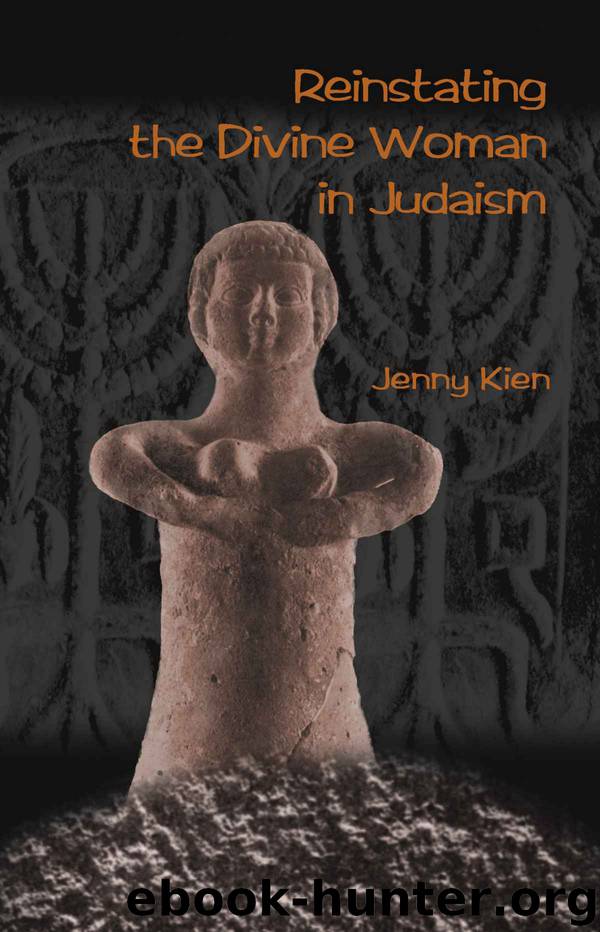Reinstating the Divine Woman in Judaism by Kien Jenny

Author:Kien, Jenny [Kien, Jenny ]
Language: eng
Format: epub
Publisher: Universal Publishers
Published: 2018-09-08T16:00:00+00:00
Chapter 6
Uncovering Goddesses in the Tanach
Looking at Jewish history from the point of view of the Divine Woman, i.e. the existence of goddesses and the honoring of women, sensitizes us to a play of forces in Judaism that is not directly obvious from the Tanach . This view reveals our pluralistic beginnings and the struggles for dominance of the opposing groups within Judaism itself. We learn something about the religion at the time many of the biblical texts were first written and about the political battles setting priorities when the texts were edited.
For many Jews today, this background is not important, for they regard the Tanach as timeless. What counts for them is not what the Tanach was taken to mean at the time of writing, but what it means today. I do not deny the richness of this approach and its immense value to those who use it, but understanding the biblical texts is only possible when we know their background. Only if we know what the writings meant at the time can we ever attempt to understand why certain emphases were set. Without this understanding, any interpretation must be to some extent fanciful, especially when a text is written in an archaic language and derives from a culture and religion that we really know quite little about. By not trying to understand the text within its context and by not insisting on taking it at face value, we run the risk of turning the text into something that cannot be questioned at all. If we are not to question whether parts could be wrong for us, or written from a perspective with which we do not agree, or even why they were written, our veneration of the text approaches idolatry of the word, [384] and Judaism adamantly condemns all forms of idolatry.
On the other hand, I do not advocate throwing away the traditional texts, for they form the written basis of Judaism. Indeed, disagreement with the text may be a fruitful path to greater understanding. Also, the Tanach is the only Jewish document with parts that date from the time when goddesses were officially worshipped in Judah and Israel - these parts include implied references to the Divine Woman. Looking for traces of the goddesses in the Tanach is one way of bringing the Jewish goddesses back to life and of counteracting the Deuteronomic diatribes, which are still working so actively against them.
Bringing the Jewish goddesses back to life means staking a claim for recognition of the Divine Woman - that is, claiming recognition not only for the goddess but also for a deep acknowledgment of the holiness of our own bodies. Finding Jewish goddesses that celebrate their bodies - goddesses that lust and bleed, bear and nourish - we declare their bodies holy and, in doing so, we honor ourselves. Trying to bring goddesses into Judaism and mainstream religions, rather than to modern feminist neo-paganism, is a demand that this recognition and honor be central in our society and its religions.
Download
This site does not store any files on its server. We only index and link to content provided by other sites. Please contact the content providers to delete copyright contents if any and email us, we'll remove relevant links or contents immediately.
Becoming Supernatural by Dr. Joe Dispenza(8204)
Crystal Healing for Women by Mariah K. Lyons(7928)
The Witchcraft of Salem Village by Shirley Jackson(7257)
Inner Engineering: A Yogi's Guide to Joy by Sadhguru(6785)
The Four Agreements by Don Miguel Ruiz(6745)
The Power of Now: A Guide to Spiritual Enlightenment by Eckhart Tolle(5760)
Secrets of Antigravity Propulsion: Tesla, UFOs, and Classified Aerospace Technology by Ph.D. Paul A. Laviolette(5368)
The Wisdom of Sundays by Oprah Winfrey(5153)
Room 212 by Kate Stewart(5105)
Pale Blue Dot by Carl Sagan(4996)
Fear by Osho(4728)
The David Icke Guide to the Global Conspiracy (and how to end it) by David Icke(4709)
Animal Frequency by Melissa Alvarez(4462)
Rising Strong by Brene Brown(4451)
How to Change Your Mind by Michael Pollan(4355)
Sigil Witchery by Laura Tempest Zakroff(4238)
Man and His Symbols by Carl Gustav Jung(4131)
The Art of Happiness by The Dalai Lama(4125)
Real Magic by Dean Radin PhD(4121)
